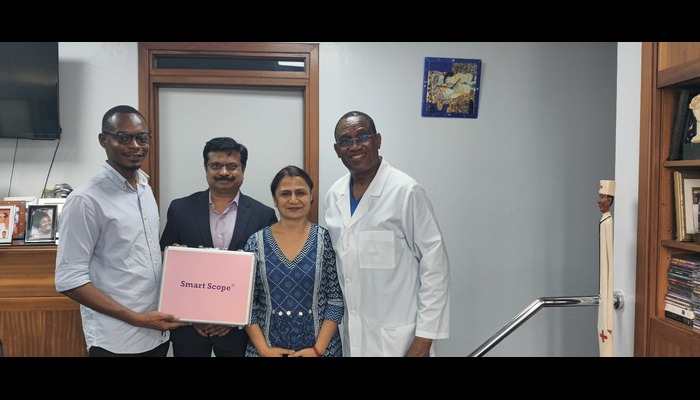How Zayed Sustainability Prize drives AI cancer screening in Ghana
In the quiet town of Battor in Ghana’s North Tongu District, a new kind of medical partnership is emerging that could redefine how women across Africa access life-saving cervical cancer screenings. The story begins not in a laboratory or a ministry office, but at a sustainability awards ceremony thousands of miles away in Abu Dhabi.
At the 2025 Zayed Sustainability Prize ceremony, Periwinkle Technologies, a health tech company from India, met Wuntia Gomda, a young Ghanaian leader and past winner of the Prize’s Global High Schools category. What followed was a connection that has since translated into a breakthrough for women’s health in West Africa.
Periwinkle Technologies has now begun screening women in Ghana using its FDA-cleared, AI-enabled device for early detection of cervical cancer. The collaboration is being implemented with the Cervical Cancer Prevention and Training Centre (CCPTC) at Battor, one of West Africa’s leading hubs for cervical cancer awareness, research, and treatment.
The system developed by Periwinkle uses artificial intelligence to analyse medical images in real time, allowing health professionals to identify pre-cancerous changes with greater precision. Unlike conventional screening methods that depend on laboratory analysis and can take days, this approach provides almost instant results. This matters deeply in rural areas, where travel times are long and access to laboratories is limited.
The partnership is an important step towards widening access to cervical cancer screening across Ghana. It combines Periwinkle’s technical expertise with CCPTC’s local experience and outreach networks. Health workers involved in the pilot programme report faster turnaround times and improved screening accuracy, while patients appreciate the simplicity and comfort of the process.

According to the World Health Organisation, cervical cancer remains one of the leading causes of death among women in sub-Saharan Africa. Early detection is key, yet access to screening remains low. In Ghana, health experts estimate that only a small proportion of eligible women are screened regularly. The Periwinkle collaboration therefore arrives at a critical moment, offering a model that can be scaled nationally and eventually across the region.
What makes this partnership particularly significant is how it came to be. After meeting Periwinkle’s leadership at the Zayed Sustainability Prize event, Wuntia Gomda helped the team understand Ghana’s healthcare environment and introduced them to CCPTC. Her insight and connections proved vital in linking innovation from abroad with local expertise and community networks.
For Wuntia, now a university student and youth sustainability advocate, the collaboration represents the continuing impact of the Prize that once recognised her own work. Her story demonstrates how the Zayed Sustainability Prize does more than reward innovation; it builds lasting ecosystems of collaboration that continue to grow well after the ceremony ends.
The Zayed Sustainability Prize, established by the United Arab Emirates in 2008, has become one of the world’s leading platforms for recognising solutions that deliver measurable social and environmental benefit. Over seventeen years, its 128 winners have reached more than 400 million people worldwide, improving access to clean energy, safe water, nutritious food, quality healthcare, and greater climate resilience. Many of those winners and finalists have gone on to form partnerships that extend their impact across borders, particularly in Africa where youth engagement and social entrepreneurship are gaining strength.
In Ghana, that global network is now driving progress in the health sector. What began as a meeting between innovators at a sustainability event has already resulted in new technology reaching women who might otherwise never have access to screening. Stakeholders from government agencies, hospitals, and NGOs are watching closely as the initiative expands, hopeful that this partnership could offer a blueprint for cost effective and inclusive screening models.
Sultan Ahmed Al Jaber, UAE minister of industry and advanced technology and director general of the Zayed Sustainability Prize, has said that when youth, entrepreneurs, and communities are empowered, ambition can be turned into action that is inclusive, practical, and global. The collaboration in Battor reflects exactly that principle in practice.
For Periwinkle Technologies, it marks a major project in West Africa. For Ghana’s health community, it is a demonstration of how international collaboration can strengthen local innovation and public health systems. And for the women now being screened in Battor, it represents hope grounded in technology, shared purpose, and a partnership born from a chance meeting that continues to change lives.

